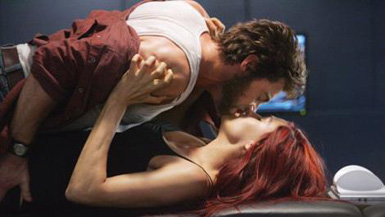Movie Review: The Wolverine
By Matthew Huntley
July 30, 2013
BoxOfficeProphets.com

At this point, is it even necessary to explain the title character or his origin? After appearing in every X-Men movie to date (including a very brief cameo in First Class), is it possible that anyone reading this review hasn’t at least heard of Wolverine, or knows that he’s one of the most popular, although certainly not the most powerful, of the X-Men, those mutant superheroes who each has a unique ability, from the power to manipulate metal, the weather, or people’s minds, to more physical-based gifts like ocular laser beams? In the case of Wolverine, a.k.a. Logan (Hugh Jackman), he heals almost instantaneously, making him immortal. He can also extend and retract his bones, which have been coated with a fictitious metal alloy called Adamantium, yielding him powerful claws that would make even Freddy Krueger envious.
When we catch up with Logan, he’s living on his own in the cold, dark and snow-fraught mountains of the Yukon. He shares the woods with grizzly bears and spends his days and nights drinking, sleeping and enduring nightmares in which he lays next to his beloved Jean Grey (Famke Janssen), the class five mutant he was forced to kill in X-Men: The Last Stand. Forlorn and guilt-ridden, if death were an option for Logan, he’d be drinking himself to it.
Instead, he simply wanders around by himself until he’s found by Yukio (Rila Fukushima), a master swordswoman and martial artist sent by her employer, Yashida (Hal Yamanouchi), the richest and most powerful man in Japan. Logan and Yashida share a history that dates back to World War II, when Logan shielded and saved Yashida during the bombing of Nagasaki. Now Yashida, who’s dying of cancer, wants to repay him by offering to “cure” Logan of his mutancy and making him mortal, which would allow him to live an ordinary life.
Of course, there’s more to the story than this, and you have to give credit to screenwriters Mark Bomback and Scott Frank for formulating a plot that keeps us interested and curious about where it’s going. Granted, the overall trajectory of The Wolverine is predictable, but it contains its fair share of emotion, humor and exciting action and special effects that are common to the genre. The movie’s pathos develops out of Logan’s relationship with Yashida’s granddaughter, Mariko (Tao Okamoto), whom he indirectly vows to protect. He smells something isn’t right when she’s nearly kidnapped by the Japanese mafia, and there’s also something off about her father, Shingen (Hiroyuki Sanada), as well as Yashida’s blonde doctor with the brown beauty mark (Svetlana Khodchenkova), who later reveals herself to be a mutant named Viper.
How all of these characters intertwine, I will not say, but I didn’t care about them for about the first third of the movie. Nothing suggested they were going to take part in anything more than one perfunctory action sequence after another, but once the screenplay started to develop Logan and Mariko together, the story gained traction and everything started to take on greater meaning. I would have preferred being invested from the outset, but I guess I should be grateful that director James Marigold, not to mention Hugh Jackman, was still able to make Wolverine likable and identifiable after all these years. The small touches help, as when Logan is bathed and made more comely by two Japanese women, or when he sits down after being shot and says, “Oh yeah, that feels good. They call this a bullet train, right?” This is followed up by a rather awesome action sequence in which Logan battles a group of hit men on top of the train as it speeds along, which was no doubt inspired by Spider-Man 2.
These and other scenes ultimately make The Wolverine fun and memorable, and the relationship that forms between Logan and Mariko has real weight, which gives the movie a heart. Marigold allows Jackman and Okamoto room to act and not simply make their characters functional to the plot. Despite its silly context, this was refreshing and unexpected.
So the movie is good, and I recommend it, but I’d be lying if I said I needed another Wolverine sequel in my lifetime, or even another X-Men installment (the follow-up to First Class is already slated for summer 2014). To me, these movies have run their course, and even if one of them proves to be a masterpiece, I feel we’ve been around the block with these characters one too many times. The superhero genre itself is wearing thin, but if they’re going to continue, and they will, the X-Men franchise should reinvigorate itself by introducing and focusing on completely new characters, at least those who haven’t been adapted into the movies before. I was actually hoping The Wolverine would end in such a way that would indicate Logan would be put to rest, but perhaps that would upset too many fans. Still, I give the movie credit for ending the way it does because it at least suggests ambiguity, or at least it did until the supplemental scene during the closing credits. Two or three movies ago, I would have been excited about what’s inevitably in store for us, but instead this left me thinking, here we go again. Personally, I’d rather go somewhere new and different.